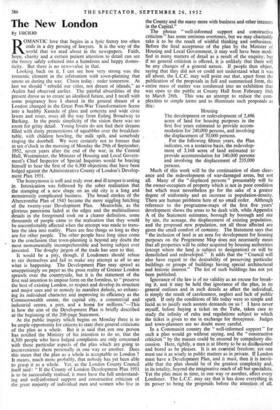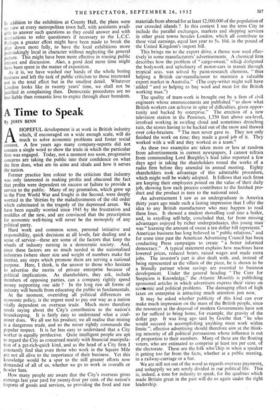The New London
By LUCILIO
ROMANTIC love that begins in a lyric frenzy too often ends in a dry prosing of lawyers. It is the way of the world that we read about in the newspapers. Faith, hope, charity and a certain patient attention to detail can see the frenzy safely softened into a humdrum and happy domes- ticity. But there is no news-value in that.
Looking back on it, I can see how very strong was the romantic element in the infatuation with town-planning that smote us during the war. Chaos today : order tomorrow. At last we should ' rebuild our cities, not dream of islands," as Auden had observed earlier. The painful absurdities of the present drove us to create an idealised futtire, and I recall with some poignancy how I shared in the general dream of a London changed in the Great Post-War Transformation Scene into a healthy Xanadu of glass and concrete and wide civic lawns and roses, roses all the way from Ealing Broadway to Barking. In the poetic simplicity of the vision there was- no room for gritty detail. Young lovers do not find their dreams filled with dusty premonitions of squabbles over the breakfast- table, with children howling, the milk spilt, and somebody ringing the doorbell. We were certainly not to foresee that at ten o'clock in the morning of Monday the 29th of September, 1952, seven years after the end of the war, in the Central Hall, Westminster, the Minister of Housing and Local Govern- ment's Chief Inspector of Special Inquiries would be bracing himself to hear the first of the 6,300 objections that have been lodged against the Administrative County of London's Develop- ment Plan 1951.
The honeymoon is well and truly over, find ill temper is setting in. Intoxication was followed by the sober realisation that the stamping of a new shape on an old city is a long and monstrously complicated business. The broad strokes of the Abercrombie Plan of 1943 became the more niggling hatching of the twenty-year Development Plan. Meanwhile, as the glorious panorama faded at the edges and the multitudinous details in the foreground took on a clearer definition, some thousands of people came to the realisation that they would be uncomfortably affected when the attempt was made to trans- late the idea into reality. Plans are fine things so long as they are for other people. The other people have long since come to the conclusion that town-planning is beyond any doubt the most monumentally incomprehensible and boring subject ever invented. The doughy jargon of the trade has seen to that.
It would be a pity, though, if Londoners should refuse to stir themselves and fail to make any attempt at all to see what is happening. The -Development Plan may sprawl as unappetisingly on paper as the gross reality of Greater London sprawls over the countryside, but it is the statement of the first real intention to impose form on the formless, to " preserve the best of existing London, to respect and develop its structure and major uses and to remedy its manifest defects, so enhanc- ing its individual character and improving its efficiency as the Commonwealth centre, the capital city, a commercial and industrial centre, a port, and a home for millions."—This is how the aim of the Development Plan is briefly described at the beginning of the 208-page Statement. At the public inquiry which begins on Monday there is to be ample opportunity for citizens to state their general criticisms of the plan as a whole. But it is said that . not one person has notified the Ministry of his intention to do so, that the 6,300 people who have lodged complaints are only concerned with those particular aspects of the plan which are going to inconvenience them personally in one way or another. Does this mean that the plan as a whole is acceptable to London ? It means, much more probably, that nobody has yet been able to grasp it as a whole. Yet, as the London County Council itself said : " If the County of London Development Plan 1951 is to be successfully realised, it must have the full understand- ing and well-informed support and constructive criticism of the great majority of individual men and women who live in the County and the many more with business and other interests in the Capital."
The phrase " well-informed support and constructive criticism ' has some ominous overtones, but we may charitably take it to be the result of wishful thinking and enthusiasm. Before the final acceptance of the plan by the Minister of Housing and Local Government, it may well have been modi- fied in many matters of detail as a result of the enquiry; but if no general criticism is offered, it is unlikely that there will be any changes of a general nature. If people then object, saying that they did not or could not understand what it was all about, the L.C.C. may well point out that, apart from the publication of the proposals in full and summarised form, the entire mass of matter was condensed into an exhibition that was open to the public at County Hall from February 16th to March 28th. This was an attempt to reduce the com- plexities to simple terms and to illuminate such proposals as this : Housing The development or redevelopment of 2,496 acres of land for housing purposes in the first five years estimated to provide accom- modation for 240,000 persons, and involving the displacement of 70,000 persons.
For the following -fifteen years, the Plan indicates, on a tentative basis, the redevelop- ment of 3,168 acres of land estimated to' provide accommodation for 340,000 persons and involving the displacement of 235,000 persons.
Much of this work will be the continuation of slum clear- ance and the redevelopment of war-damaged areas, but not all. Many of the " displaced persons " presumably will be the owner-occupiers of property which is not in poor condition but which must nevertheless go for the sake of a greater degree of uniformity and an increase in population-density. There are human problems here of no small order. Although reference to the programme-maps of the first five years' development shows the areas to be dealt with, while Appendix A of the Statement estimates, borough by borough and site by site, the acreage, the displacement of existing population, and The proposed new population, not all those 'affected are given the small comfort of certainty. The Statement says that the inclusion of land in an area for development for housing purposes on the Programme Map does not necessarily mean that all properties will be either acquired by housing authorities (except where the land is subject to designation) or will be demolished and redevero'ped." It adds that the " Council will also have regard to the desirability of preserving particular buildings or groups of buildings having special architectural and historic interest." The list of such buildings has not yet been published. Ignorance- of the law is of no validity as an excuse for break- ing it, and it may be held that ignorance of the plan, in its general outlines and in such details as affect the individual, is simply the result of carelessness, neglect and lack of public spirit. If only the conditions of life today were so simple and lucid as to justify such austere demands on us ! I have never myself, before buying a ticket on the Tube, taken care to study the infinity of rules and regulations subject to which the ticket is given to me in exchange for threepence. Judges and town-planners are no doubt more careful.
In a Communist country the " well-informed support " for such a plan would go without saying, and. the " constructive criticism " by the masses could be ensured by compulsory dis- cussion. .Here, rightly, a man is at liberty to be as disillusioned and bored as he pleases. It is an essential freedom; yet one must use it as wisely in public matters as in private. If London must have a Development Plan, and it must, then it is inevit- able that the plan should be of the greatest complexity and, in its totality, beyond the imaginative reach of all but specialists.. Yet the plan must in time, in one way or another, affect every Londoner. The L.C.C. may say that it has done everything in its power to bring the proposals before the_ attention; of '411. , . In addition to the exhibition at County Hall, the plans were on view at every metropolitan town hall, with assistants avail- able to answer such questions as they could answer and with instructions to refer questioners if necessary to the L.C.C. Perhaps a greater effort might have been made to break the plan down more fully, to have the local exhibitions more painstakingly local in character without neglecting the general picture. This might have been more effective in rousing public interest and discussion. Also, a good deal more time might have been spent in the matter of exposition.
As it is we have washed our hands of the whole boring business and left the task of public criticism to those interested not in the total effect but in the smallest detail. Whatever London looks like in twenty years' time, we shall not be justified in complaining then. Democratic procedures are no less liable than romantic love to expire through sheer boredom.



































 Previous page
Previous page